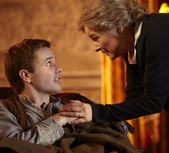SITE GUIDE
SEARCH
REVIEWS
REVIEW ARCHIVES
ADVERTISING AT CURTAINUP
FEATURES
NEWS
Etcetera and
Short Term Listings
LISTINGS
Broadway
Off-Broadway
NYC Restaurants
BOOKS and CDs
OTHER PLACES
Berkshires
London
California
New Jersey
DC
Connecticut
Philadelphia
Elsewhere
QUOTES
TKTS
PLAYWRIGHTS' ALBUMS
LETTERS TO EDITOR
FILM
LINKS
MISCELLANEOUS
Free Updates
Masthead
Writing for Us
A CurtainUp  London Review
London Review
 London Review
London ReviewJuno and the Paycock
by Tim Macavoy
|
It's nearly time we had a little less respect for the dead, an' a little more regard for the living. — Juno Boyle
|

Ronan Raftery as Johnny Boyle and Sinéad Cusack as Juno Boyle
(Photo: Mark Douet) |
That's not to say Juno and the Paycock is a flag-waving example of patriotism, the carefully drawn characters in this family on the edge of poverty and sanity expose the best and worst of family life in the Irish Civil War of the 1920s. The historical context and the heavy accent, however, may prove a little impenetrable for some stiff-upper lips in the UK.
Jack Boyle (Ciarán Hinds), the patriach of the family, is out of work, drowning his sorrows with a questionable friend – Joxer (Risteárd Cooper). His long-suffering wife Juno (Sinéad Cusack) attempts to hold the family together, making the best of their dilapidated tenement. The vast space of the Lyttleton may suggest a former grandeur of the residence, but programme notes give some shocking figures as to the cramped conditions Dubliners were forced to live in, sometimes 19 families to a house. The set and sound help too, with exposed frames, crumbling masonry, and the consistently ominous booming of footsteps in the hallway – never knowing whether the incoming visitor is friend or foe.
The Boyle son Johnny (Ronan Raftery) lost his arm, and worse, his mind, while fighting for the IRA in the divisive civil war, while daughter Mary (Clare Dunne) is on strike after joining the labour movement. It is Mary who seems to hold out most hope for the future, dating an educated, well-dressed man, but such a feeling of doom pervades the family's situation that as an audience member it is hard to see anything but tragedy ahead, even with the news that the Boyles are about to receive a large inheritance.
In typical Irish style, the tragedy is underscored by wonderfully dark humour, bravely balanced in a grey light by director Howard Davies. Social status is often played upon, with Jack and Joxer on the bottom rung, trying to hide evidence from Juno that they've been eating sausages, which flips when a refined gentleman enters the apartment and Juno is compelled to scrabble around the floor like a madwoman searching for hidden dirty plates with great physical humour. Joxer is an opportunist, who will steal his friends drink and money, but does so with a smile, a song and a dance – literally jumping out the window when times get too tough. Mrs Madigan (Janet Moran) is his female counterpart, flirtatious and rough throughout; but in a defining moment, which underlines the gender differences in the play, she comforts the grieving Juno, whereas Joxer merely steals Jack's last penny.
It's a respectful portrayal of femininity and motherhood, at a time when it was hard for women to have control over their own lives, and Sinéad Cusack brings the full force of her acting experience to the difficult role of Juno – providing strength, sensitivity, fear and faith beyond reason. Her final prayer echoes on: "Blessed Virgin, where were you when me darlin’ son was riddled with bullets? Sacred Heart o’ Jesus, take away our hearts o’ stone, and give us hearts o’ flesh! Take away this murdherin’ hate, an’ give us Thine own eternal love!"
|
Subscribe to our FREE email updates with a note from editor Elyse Sommer about additions to the website -- with main page hot links to the latest features posted at our numerous locations. To subscribe,
E-mail: esommer@curtainup.comesommer@curtainup.com
put SUBSCRIBE CURTAINUP EMAIL UPDATE in the subject line and your full name and email address in the body of the message -- if you can spare a minute, tell us how you came to CurtainUp and from what part of the country. |
| Juno and the Paycock
Written by Sean O’Casey Directed by Howard Davies Starring: Sinéad Cusack, Ciarán Hinds, Risteárd Cooper, Clare Dunne, Ronan Raftery, Nick Lee, Janet Moran With: Cornelius Clarke, Kieran Gough, Luke Hayden, Dermot Kerrigan, Gillian McCarthy, Bernadette McKenna, Brian Martin, Kevin Murphy, Sophie Robinson, Eoin Slattery, Tom Vaughan-Lawlor Design: Bob Crowley Music: Anna Rice Sound: Ben Delaney Lighting: James Farncombe An Abbey Theatre Dublin co-production Running time: Two hours 35 minutes with an interval Box Office: 020 7452 3000 Booking to 26th February 2012 Reviewed by Tim Macavoy based on 17th November 2011 performance at The Lyttelton, National Theatre, South Bank, London SE1 9PX (Rail/Tube: Waterloo) |
|
REVIEW FEEDBACK Highlight one of the responses below and click "copy" or"CTRL+C"
Paste the highlighted text into the subject line (CTRL+ V): Feel free to add detailed comments in the body of the email . . . also the names and emails of any friends to whom you'd like us to forward a copy of this review. |




